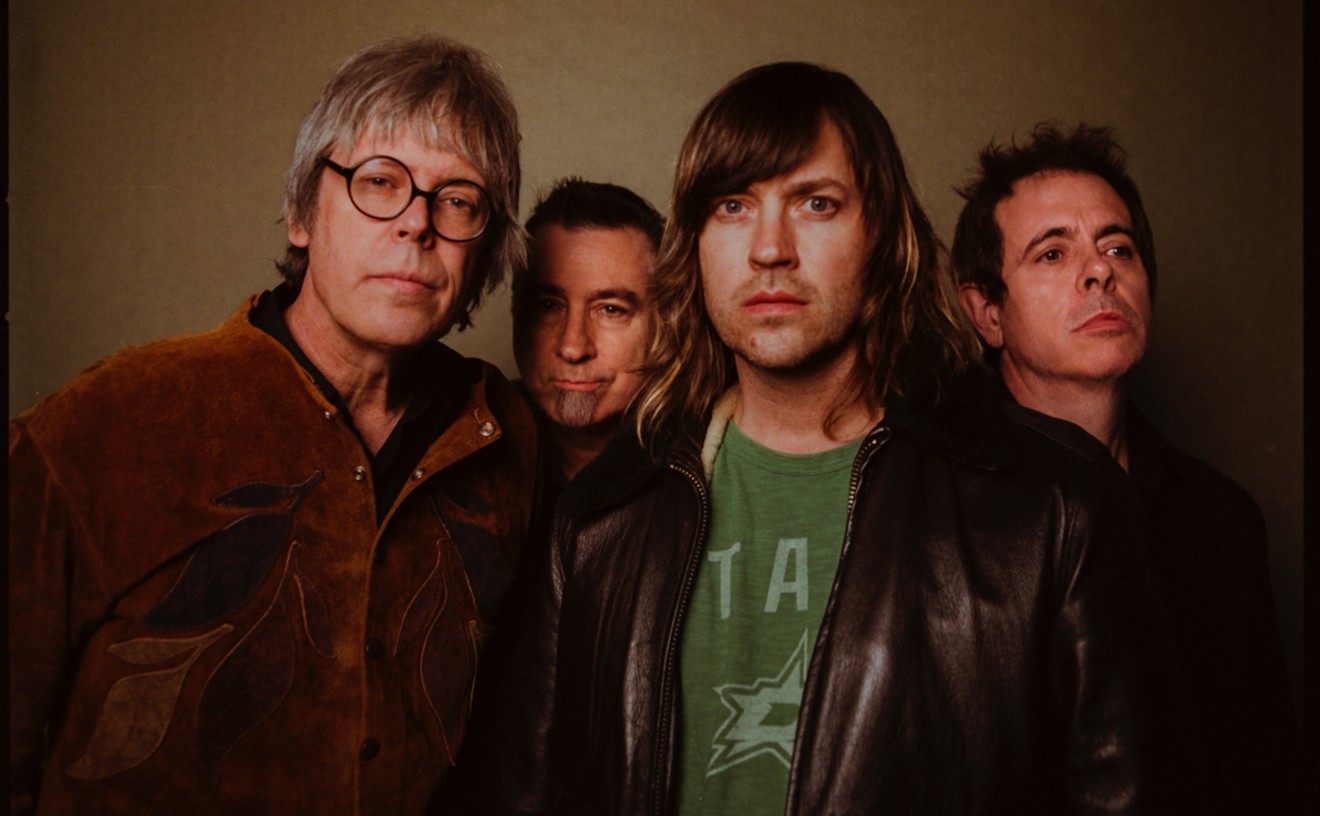"We looked at each other and got scared," Lynn says, referring to her remaining family and friends. "Who would be next? That's why, when I care about somebody, I always tell 'em, 'I love you,' before I leave 'em. And sometimes it's just if I have a good time with somebody, if they make me laugh, I'll tell 'em. They'll look at me strange. But I don't know if I'll see 'em again."
These days, Lynn is joyous to see her shows sell out, as most of the dates on her current tour have. But Lynn the businesswoman had to stand tall where today's major-label country fools stumbled. MCA, her longtime label, didn't want to sign another deal in an era where the youth audience rules country as much as it does on the dance and pop charts. Financially secure and determined to be selective, Loretta doesn't give a shit about ruling the charts, as she did 30 years ago. Her next album, she swears, will include pure honky tonk songs, including one randy number about a lover's forceful touch called "Don't Rescue Me" (just cause "he's got his hands all over me").
These days, she sounds just as playful. On the phone, Lynn utterly lacks PR polish, exuding a mercurial interest in the right-now rather than the publicity at hand. She doesn't wait for you to ask questions about Still Country, her return to the studio after an arduous 12-year absence, and sometimes skips right over them when you do. Instead, her East Kentucky slur charges forward cheerfully with a question: How is the weather in Dallas?
It's practical: Last year, Lynn tumbled down a staircase and injured her knee. She still hasn't shaken the injury; recently in St. Petersburg, Florida, she performed before thousands of fans while seated in a green lawn chair pushed right up to the edge of the stage for the entire 90-minute set. When the weather's chilly, her knee hurts more. This isn't a complaint, nor a warning of any upcoming cancellations in her first major tour in well over a decade. "The only problem'll be with me," twangs Lynn, who eschews prescription painkillers for Tylenol.
"[Back in Butcher's Hollow], my mama told us to chew the soft branches from the willow trees when we hurt ourselves," Lynn free-associates. "She was half-Cherokee and half-Irish, and daddy was half-Cherokee and half-Irish. Later on, I found out it was the same stuff they put in Tylenol. And when I used to eat green apples, I'd get a stomach full of worms; I was a wormy girl. Momma fed us a tablespoon of sugar with three drops of turpentine [to kill the worms]. I collected all her remedies, but the publisher said if somebody accidentally died after they took one, they'd sue me for everything I got."
The 66-year-old Loretta Lynn enjoys a position of popular appeal and artistic freedom for reasons you can find in that home-remedy story. Nor has she ever abandoned the clear-eyed hillbilly soul that occasionally affronts country-music impresarios, who talk down-home but expect a modicum of what Lynn calls "up-town" sophistication from their major artists, lest potential consumers be turned off. Unlike her much-missed friend and mentor Patsy Cline, Loretta Lynn didn't appeal instantly to mainstream fans of soul and pop. But Lynn did enchant early purists who understood why a woman with such a sensual, slow-step rhythmic way with lyrics would pause to pronounce "wire" as "war" and "pair" as "par." Longtime fans have noted two phases in her long career: earnest as a girl singer-songwriter, honest as a woman musician.
"I've always sung about true life," Lynn says. "And sometimes, they couldn't stand that. But tell me, when was the last time you remembered that fantasy song that was a hit 10 or 15 years ago?" In the same breath, she declares, "I like most of the female singers in country today. I love to hear Martina [McBride] sing. But when I watch the videos, I think, 'That's too extreme for country, and they know it.' You never woulda caught me kicking around naked underneath a sheet in a video. I love Faith [Hill], but I could kick her hind end for that video ['Breathe']. She had short hair before, and suddenly, she had long hair."
Lynn has scored 51 Top 10 singles (half of them sailing to No. 1) with precisely the kind of unscrubbed persona that'd be moussed to within an inch of its life were she to enter the industry today as a young woman. But the brains behind that beautiful mountain-woman face have always been all-business. As she chronicled in her best-seller Coal Miner's Daughter and the Sissy Spacek flick that turned non-country fans into devotees, her husband didn't only buy Loretta her first acoustic guitar (for $17 from Sears), but chaperoned her through the music-business shark tank. He saw to it that she formed and controlled her own publishing company, helping her retain her royalties. Doolittle, who died five years ago, also sat back as an increasingly fearless Loretta racked up self-penned hits through the '60s and '70s that chronicled his drinking and womanizing--among them, "You Ain't Woman Enough," "Don't Come Home Drinkin' (With Lovin' On Your Mind)," "Fist City," and "Your Squaw's On the War Path."
A bit later on, she'd vigorously defend divorced women (1971's "Rated 'X'") and adulteresses (the same year's "Back Street Affair," with Conway Twitty), and prepare the world for "The Pill" (1972), which features a woman proudly trading maternity dresses for hot pants and mini-skirts, "'Cause now I've got The Pill." It was unprecedented then, and anyone who thinks this hilarious and soulful 29-year-old champion of oral contraceptives is quaint today, ask yourselves: What major corporate label would dare release a cover-version single and video by Faith Hill or Martina McBride to contemporary country audiences?
"They banned it all over the Bible Belt," says Lynn. "But it still went Top 10, 'cause women wanted to hear it. For a while, college students were the only ones who'd talk to me, for underground newspapers. A bunch of 'em'd meet me after shows, and we'd sit around on the floor of my dressing room and talk."
Times have changed, but that doesn't necessarily mean that Lynn has to change with them. What's most impressive about her new album for Audium/Koch, Still Country, is that producer Randy Scruggs (son of Nashville banjo stalwart Earl Scruggs, who plays his signature instrument and acoustic guitar on these recordings) hasn't forced Lynn in any reactionary direction. She's backed by neither drum machine-pounding Young Country arrangements nor retro acousticism. The result is a tasteful and intelligent album, one that doesn't squeeze her into the power-pop ballads that are the specialty of the white-hatted boys and spiky-haired girls of current country radio. She strips the years away on her own: Lynn's voice sounds almost as young and earnest--hungry in the meanest songs, kittenish and flirtatious in the lighter exercises--as when she recorded her first hit in L.A., 1960's I'm a Honky Tonk Girl. She has a plain, technical explanation for the weird youthfulness in her latest vocal delivery.
"You're missin' my harmony," she says, laughing. "And I am, too. I was the first girl in Nashville to record her own harmonies. And now all Nashville is shocked. 'You don't sound like yourself, Loretta.' But [when he was producing the album] Randy said, 'No harmonies with yourself,' and I love 'em. It was part of some new sound. So I said, 'Yeah, but I ain't figurin' on keepin' it up"
The contributions from admiring songwriters are nothing compared to one of her own compositions, "I Can't Hear the Music." She says she's surprised (and, unspokenly, a bit dismayed) at Audium's decision to release this as the second single; it recounts Doolittle's final, bedridden days in 1996 during a cruel bout with diabetes. First he was blinded, then went deaf, and gave Loretta the title of her tune when he painfully whispered that he could no longer hear her comforting bedside singing. The suits have repeatedly offered a very bizarre suggestion to her about this song, from her early attempts in the recording studio to preparations for an upcoming live two-hour tribute on A&E dedicated to her career: "Think about something else when you sing it." Lynn was finally able to lay a decent track, only after--during a long workday without food--she concentrated hard on the Snickers bar she wanted in a nearby vending machine. But she's scared about recreating it live.
"I've never sung ['I Can't Hear the Music'] live," she says. "They want me to start, 'cause they've got the single pressed and ready to deliver. But I'm afraid I can't get through it. I don't wanna hit the stage floor cryin'," she says with a small chuckle. Lynn evinces very little confidence about what re-confronting Mooney's death in front of thousands of fans will do to the seasoned performer who demanded the first ever full drum set on the Grand Ole Opry stage (for the 1968 live debut of her hit "Your Squaw's On the Warpath").
The sorrow in Still Country, however reserved, is still a bit too authentic and ubiquitous for young country programmers. With a single fiddle rising and diving in tearful sympathy, Vince Gill's "Table for Two" and Randy Scruggs' "On My Own Again" are modest but unvarnished weepers about a woman, suddenly abandoned, who can't step into the public world without breaking down. Surprisingly, Lynn admits some regret at the content of her new release. Still recovering from the death of her beloved "Doo," she didn't realize her own obsession in the artistic process.
"I shoulda waited longer," Lynn says solemnly about her selection of the tunes. "I was under the eight-day flu [when I picked the songs]. I shoulda waited till the hurtin' stopped, but you don't know if the hurtin's ever gonna stop. I held out as long as I could while it was holdin' down on me. But too many of 'em sound the same, even though I love the songs. But I guess it's OK--it's what I was feelin' at the time."










